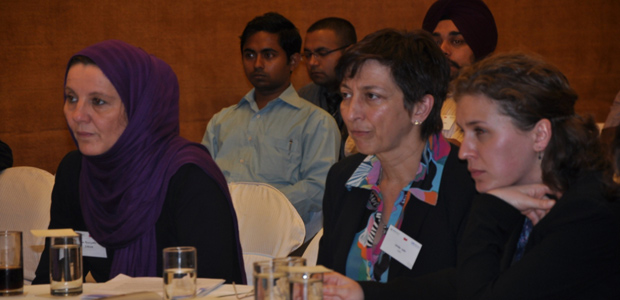
The Global Atlas for Solar and Wind Energy; Economic Value Creation of Solar and Wind Projects
During the fourth meeting of the Clean Energy Ministerial (CEM 4), international representatives explored resource assessment and value creation opportunities for solar and wind energy at a workshop co-organised by the International Renewable Energy Agency (IRENA).
The CEM 4 side-event, held on 16 April in Delhi, India, was hosted by The Energy and Resources Institute (TERI) at the India Habitat Centre. Participants came from the embassies of Germany, Spain and Denmark, as well as from the Renewable Energy Policy Network for the 21st Century (REN21), the United Nations Environment Programme (UNEP), the German International Cooperation Agency (GIZ) and other agencies.
IRENA opened the first session with a presentation on the status and perspectives the Global Renewable Energy Atlas, which was initially dedicated to solar and wind resource potential and will soon include other renewable energy types. UNEP highlighted its own involvement in the Global Atlas initiative, while the Centre for Wind Energy Technology (CWET) and TERI discussed their experiences with resource mapping in India.

CEM delegates discuss value creation from solar and wind energy
Private sector representatives – from GL Garrad Hassan, a technical consultancy for renewable energy (part of the Germanischer Lloyd group), and the Indian wind turbine supplier, Suzlon Energy – pointed out the added value of resource mapping and spatial planning to secure investments. The session was chaired by Martha Ekkert, from the German Federal Ministry for the Environment, Nature Conservation and Nuclear Safety (BMU), and Anders Hasselager, from the Danish Ministry of Climate, Energy and Building.
A second session highlighted IRENA activities to analyse the value creation from large-scale solar and wind deployment. Project leaders outlined the progress on work to analyse macroeconomic impact, identify policy design options and optimise value-creation effects, along with a review of existing policy tools and advisory services. One of IRENA’s partners in these activities, TERI, presented India’s experience in renewable energy from an economic value creation perspective, including the impact of solar and wind energy programmes on job and wealth creation in urban and rural areas. Rabia Ferroukhi (IRENA) and Henriette Schweierhof (BMU) chaired the session.
Download the workshop agenda here.
Presentations from the workshop are also available.
Session 1:
- IRENA: Global Atlas
- UNEP: Global Atlas involvement
- CWET-GIZ:solar mapping (India)
- CWET: wind mapping (India)
- TERI: Gujarat RE Atlas
- GLGH: Mesoscale wind mapping
Session 2:
- IRENA:Economic Value Creation of RE Deployment
- WindGuard-Prognos: Variables and methodologies for value creation impact assessment
- IEA-RETD: Policy instruments to support RE industrial value chain development
- Imperial Centre for Energy Policy and Technology: Tools and advisory service
- TERI:
- Socio-economic benefits of India’s RE experience